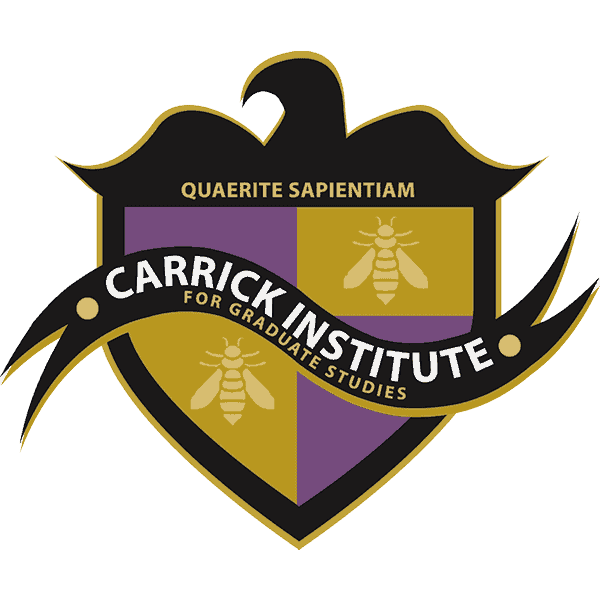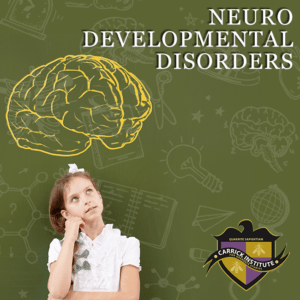Neurodevelopmental Disorders
The Need for Highly Trained Clinicians is Greater Than Ever

Autism Awareness Month
Throughout this month, we are pleased to offer exclusive discounted tuition rates for our Neurodevelopmental Disorders Program.
Take advantage of our Neurodevelopmental Disorders prepayment tuition pricing and save an additional $1,000 on the NDD prepayment option.
Use code “NDDSALE” to save on the NDD prepay.
OR
Save $100 off any online, self-paced module in the Neurodevelopmental Disorders program.
Use code “NDD100” to save on individual modules.
*New registrations only, must register online.
Neurodevelopmental Disorders
Presented by: Dr. Matthew Worth
With an increase in the prevalence of developmental disorders, the need for properly trained clinicians that understand the neurophysiology, know how to make the correct diagnosis, understand the co-management with various levels of healthcare and support, and have mastery of a functional neurology approach to treating these conditions is higher than ever.
That is why we created the Neurodevelopmental Disorders series. This NEW 6-module program builds on top of current best research and understanding of developmental disorders as well as the latest advancements in their treatment.
Who is this class for?

The healthcare professions that can attend this program are: MD, DC, DO, PT, OT, ATC, LMT, ND, LAc, PA, NP, CA (If accompanied by DC). If you have any questions about your eligibility to attend this program, you can contact us via the Contact Us page.

What type of conditions/patients will clinicians be able to address?
- ADD/ADHD VS. Executive Function Disorder
- Spectrum Disorders
- Asperger’s Syndrome
- Mild-Severe Autism
- Rhett Syndrome
- Behavioral Disorders
- OCD
- Anxiety disorders
- PDD-NOS
- ODD
- Sensory Modulation Disorders (SMD)
- Intellectual disorders
- Language and learning
- Dyslexia
Neurodevelopmental Disorders Course Objectives
- Incidence and comorbidities of NDD for the infant, toddler, adolescent and adult
- Review of currently accepted etiologies and management (including medications)
- Understand CNS developmental disruptions
- Developmental milestones and effect of delays
- Identification, pathophysiology and management of neurodevelopmental disorders
- Creating an evidence-based treatment plan with measurable objective outcomes
- Examination and management of the:
- Newborn
- Toddler
- Adolescent
- Brain-Gut Connection
- Nutritional interventions strategies
- Impact of primitive reflex development/delay
- Neuropsychological Testing
- Neurocognitive testing and interpretation
- Achievement testing and interpretation
- The American Disabilities Act
- Educational Accommodations
- IEP vs. 504 Plan
- Educational Accommodations
- Interventions and Treatment
- High-tech and Low-tech neuro-rehabilitation
- Home-based treatment programs
- Parenting Strategies
- Positive vs. negative reinforcement
- Effects on the brain (gray matter)
- Positive vs. negative reinforcement
- Practice Management of the Neurodevelopmental Delay Clinic
- Developing co-management relationships with other professionals
- Developing YOU as “The Community Expert”
- Patient and Student Advocacy
Neurodevelopmental Disorders Course Curriculum
In order to deliver effective and powerful care, an understanding of the “how” and the “what” is critical. Understand the Physiology and the Pathophysiology of Neurodevelopmental Disorders.
Topics Discussed in Module 1 include:
- Physiology
- Neural development
- Spatial and Temporal Coherence of the sensory development
- Spatial and Temporal Coherence of the motor development
- Development and shaping of the limbic system
- Disruption of CNS development (Pathophysiology)
- Neural tube & defects
- Inborn errors of Metabolism
- Developmental coordination disorders
- Developmental intellectual disorders
- Developmental pervasive disorders
- Polyvagal theory and its application to developmental disorders
- Executive Dysfunction Disorders
- ADD/ADHD
- Major diagnostic categories and terminology – DSM-V
- Proposed causes
- Comorbidities
- Pathophysiology
- ADD/ADHD
- Developmental Intellectual Disorders
- Learning and Language Disorders
- Major diagnostic categories and terminology – DSM-V
- Proposed causes
- Comorbidity
- Pathophysiology
- Learning and Language Disorders
- Behavior Disorders
- OCD
- Major diagnostic categories and terminology – DSM-V
- Proposed causes
- Comorbidities
- Pathophysiology
- Anxiety
- Major diagnostic categories and terminology – DSM-V
- Proposed causes
- Comorbidities
- Pathophysiology
- OCD
- Developmental Pervasive Disorders
- PDD-NOS
- Major diagnostic categories and terminology – DSM-V
- Proposed causes
- Comorbidity
- Pathophysiology
- ODD
- Major diagnostic categories and terminology – DSM-V
- Proposed causes
- Comorbidity
- Pathophysiology
- PDD-NOS
- Developmental Coordination / Sensory Disorders
- SMD – Sensory Modulation disorders
- Major diagnostic categories and terminology – DSM-V
- Proposed causes
- Comorbidity
- Pathophysiology
- SMD – Sensory Modulation disorders
- Major diagnostic categories and terminology – DSM-V
- Identifying Characteristics
- Developmental course
- Social interactions
- Communication skills
- Proposed causes
- Comorbidity
- Pathophysiology
- Mirror Neuron System
- Social interconnectivity
- Mitochondrial dysfunction
- Neurotransmitters (serotonin) o Brain-gut connection
- Evaluation and Management
- Autism
- Asperger’s Syndrome
- Rhett Syndrome
- Evidence-Based Interventions / Co-management
- Applied Behavioral Analysis – ABA
- Social Skills Training
- Medications
- Occupational Therapy/SLP
- Neurotypical vs. Non-neurotypical vs. Normal variant
- Examination of Newborn
- Developmental milestones o Primitive Reflexes
- Parent questionnaires
- Examination of Toddler
- Developmental milestones
- Parent questionnaires
- Examination of the Adolescent
- Developmental milestones
- Parent questionnaires
- Neuropsychological testing
- Cognitive
- Achievement
- Reliability, Sensitivity
- Interpretation & intervention
- High tech interventions
- Leveraging technology in the treatment of NDD conditions
- Low tech interventions
- Leveraging low-tech management of NDD conditions
- Co-Management/Management Team
Presenting Faculty

Dr. Schmoe is the founder and director of The Functional Neurology Center. Over the past 13 years, he has been working with patients with complex neurological dysfunction. He manages patients from all over the country as well as international. He has treated thousands of patients with head injuries, vertigo, dysautonomia, dizziness, movement disorders, neuro-degenerative and developmental disorders. He treats patients of all ages. He enjoys seeing the most complex cases Integrating neuro-rehab, manual therapy, lab work and nutrition. He has completed extensive post-graduate training in functional neurology, neuroimmunology and functional medicine.
He is a Diplomate of the American Chiropractic Neurology Board DACNB, Fellow of the American College of Functional Neurology and was the valedictorian of the 2015 FABBIR Carrick Institute TBI program. #carricktrained. He graduated from NWHSU in 2011 with his Doctorate of Chiropractic. He graduated from MNSU Mankato in 2007 with his Exercise Science Degree. He has completed thousands of hours of post graduate neurological training in vestibular rehab, autonomic disorders, complex chronic pain, developmental disorders, neurochemistry, immunology and various manual therapy techniques.
Course Information
Included In Your Tuition
25 Neurology Hours Per Module - Approved by the ACNB / ACFN
Receive any future updates to the course videos or other materials
All-Access to the digital recording of the class
Re-attendance – Retake the class on-site, via Livestream, or via online, self-paced learning as many times as you’d like as an audit.*
3 months of unlimited access to Medline
Re-attendance policy: Scholars who have registered and completed the program have the ability to re-attend the course with no additional fee. When re-attending a course, the scholar will not receive continuing education credits and will receive an audit. Carrick Institute is not responsible for providing new materials for class audits, including but not limited to manuals, shirts, equipment, etc. If manuals have been updated since the original attendance date, the updated materials will be available via PDF on the scholar’s online portal. If the scholar would like to purchase a new paper manual, they may do so before the course start date.
The All-access and re-attendance are part of your tuition and are specific to this program. The re-attendance is considered an audit of the course material and does not yield CE or CEU credits. It does transfer to other programs offered by the Carrick Institute.
To view full Terms & Conditions, click here.
For more information on CE/CME eligibility, visit https://carrickinstitute.com/ceinfo/
We utilize a clinical flipped classroom where participants will have reading and study materials sent to them before the class begins. They will be able to familiarize themselves with the material and complete the necessary requirements that will allow them a superior educational experience.
We want our participants to develop lifelong learning skills and mastery of their clinical applications. Participants in our program will receive a continuous follow-up of training that is delivered to their smartphone, tablets, or computer after they have completed the program at no additional cost.
All participants are given access to the Carrick Institute library and Medline access. They will have direct access to published scientific papers that will complement their learning and increase their clinical skills.
The Carrick Institute has provided clinical graduate school education for healthcare professionals for over four decades. Our faculty are experienced clinician educators that have an international reputation for excellence. Our course instructor is recognized throughout the world for his clinical applications in this knowledge area. Professional athletes, Olympians, Collegiate athletes, celebrities and more call on Carrick faculty members from around the world when they have suffered brain injury or neurological compromise, or any decrease in their performance.
Continuing Education
Continuing education requirements to maintain certification status through a professional association are usually separate from the state board’s requirements. In order to maintain your certification status in your state please submit a State Continuing Education Application Form.
*We cannot guarantee approval for individual state CEUS. Each state has different rules and regulations. State Applications need to be submitted at least 90 days prior to the state date of your course*
Recertification / Diplomate Requirements: All Carrick Institute courses are approved by the ACFN & ACNB.
-
Neurodevelopmental Disorders
NeuroDevelopmental Disorders Self-paced Bundle
$8,400.00Original price was: $8,400.00.$6,600.00Current price is: $6,600.00. Add to cart -
Neurodevelopmental Disorders
Treatment & Management of Neurodevelopmental Disorders (796)
$1,450.00 Add to cart -
Neurodevelopmental Disorders
Examination of the Newborn, Toddler and Adolescent (795)
$1,450.00 Add to cart -
Neurodevelopmental Disorders
Clinical Applications within the Spectrum Part II (794)
$1,450.00 Add to cart -
-
Neurodevelopmental Disorders
ADD, ADHD, ODD, OCD, PDD-NOS… And the rest of the alphabet (792)
$1,450.00 Add to cart -
Neurodevelopmental Disorders
Physiology & Pathophysiology of Neurodevelopmental Disorders (791)
$1,450.00 Add to cart



